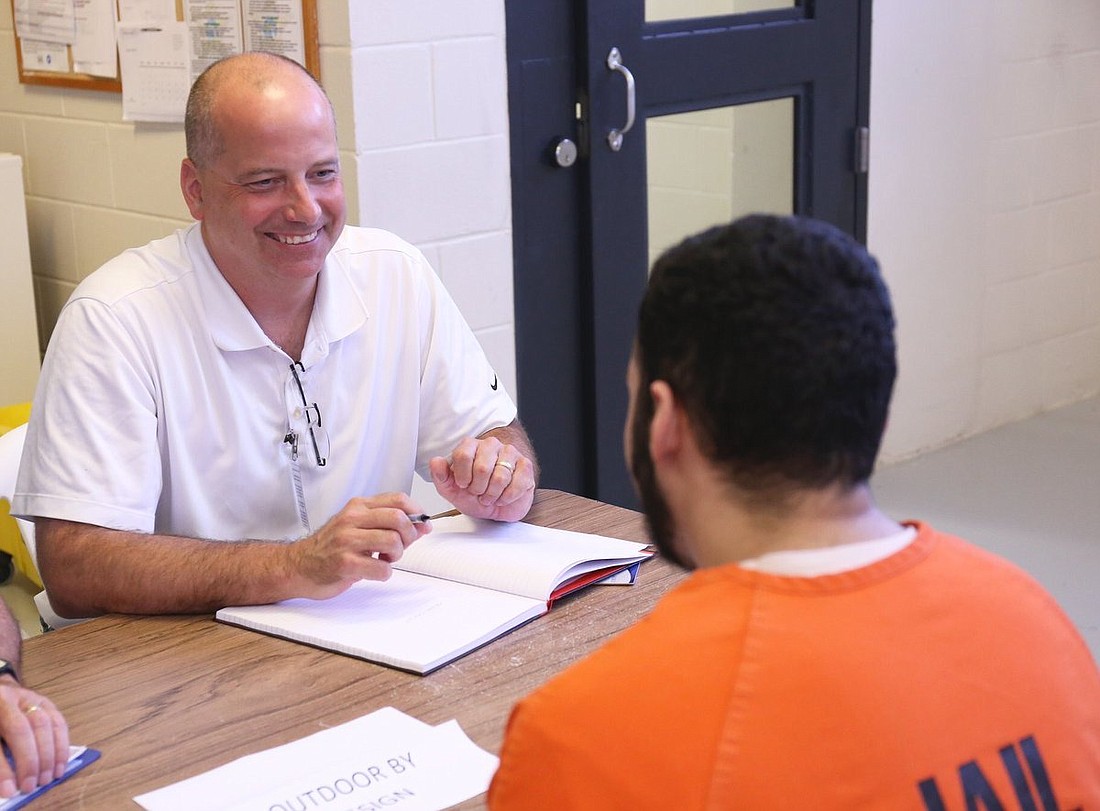- May 5, 2025
-
-
Loading

Loading

Sometimes people need a second chance, and that’s exactly what the Sarasota County Sheriff’s Office is focused on giving its jail inmates.
Sarasota County Jail prides itself on a variety of specialized programs that help inmates transition into life after imprisonment.
From specialized pods that tackle substance abuse and teach life skills to programs that help prepare inmates for job interviews or housing upon release, Chief Deputy Col. Kurt Hoffman said the department is focused on enhancing the lives of the inmates.
“What we’re trying to do, in whatever way we can, is prevent recidivism,” Hoffman said. “We don’t want them to come back. We want them to be successful.”
The department’s newest effort, a veterans housing initiative, was launched July 3. The initiative groups veterans together to offer programs on how to gain access to the GI Bill, discharge paperwork, disability options and veteran IDs.
Additionally, the inmates will receive regular support from volunteers and members of the military and veteran communities.
“Veterans have a unique set of issues with post-traumatic stress disorder and integration back into society and job skills because they’ve been in the military,” Hoffman said. “It seems more conducive if they’re all in an environment where they can share their stories together.”
Currently, there are 70 veteran inmates in the facility. Ten have signed up for the voluntary housing, but personnel expects that number to grow as the program becomes more well known.
Additionally, in an effort to help prepare inmates for discharge, the jail held an inmate job fair in June where eight area employers went to the jail and met with inmates.
One of those employers, Charlie King, the operations manager of King Plastic Corp., said the company participated because it believes in second chances.
“As a company and a family, we believe in second chances, helping out in our community and being a good steward for the society we live in,” King said. “We do believe people can change. We do believe that people can better their lives.”
King acknowledged that some employers might be wary about hiring former inmates, but he said that through setting general rules, such as hiring nonviolent and nonrepeat offenders, his company has seen great success with its hires.
“On a regular basis, we see a lot of good, heartwarming stories of people turning their life around,” King said. “It’s definitely one of those things that keeps reassuring you that you’re making the right decisions.”
Although Hoffman didn’t know the total number of participants, he said 13 inmates will be released from custody and have jobs waiting for them.
In addition to the job fair, the jail welcomed Florida Licensing on Wheels back for the second time in June. FLOW, which is run by the Florida Department of Highway Safety, helps inmates get state-issued driver’s licenses and identification cards.
“It can be a big stumbling block,” Hoffman said. “When they get out, they don’t have ID. And you can’t cash a check; you can’t open a bank account — there’s just a lot of things you can’t do if you don’t have a photo ID.”
The identification cards are paid for by the jail’s inmate welfare fund, which is funded by proceeds from the jail commissary. Hoffman said 33 inmates will reenter society with identification cards.
“We’re just trying to remove the impediments that cause inmates to fail on the outside,” he said.
One woman who has benefitted from the jail’s programs is Kristen Mitchell, who began her recovery from substance abuse in the jail’s recovery pod.
“Exactly one year ago, my life changed forever,” Mitchell said in a Facebook post. “I was completely hopeless and lost. My addiction had sunk its claws into my soul and was slowly killing me from the inside out. I was miserable and yet still spent every day trying to please my habit just to get through the day.”
However, with the help of the recovery pod and the jail’s volunteers, Mitchell said she was able to get her life back on track. Now she is proud to work a full-time job and celebrate a year of sobriety.
Hoffman said it is stories like these that encourage the department to find more ways to help the inmates.
“My goal is to free up those beds in the jail for those people that I really should be keeping in the jail and help these folks to the extent that we can,” Hoffman said. “It’s the right thing to do.”